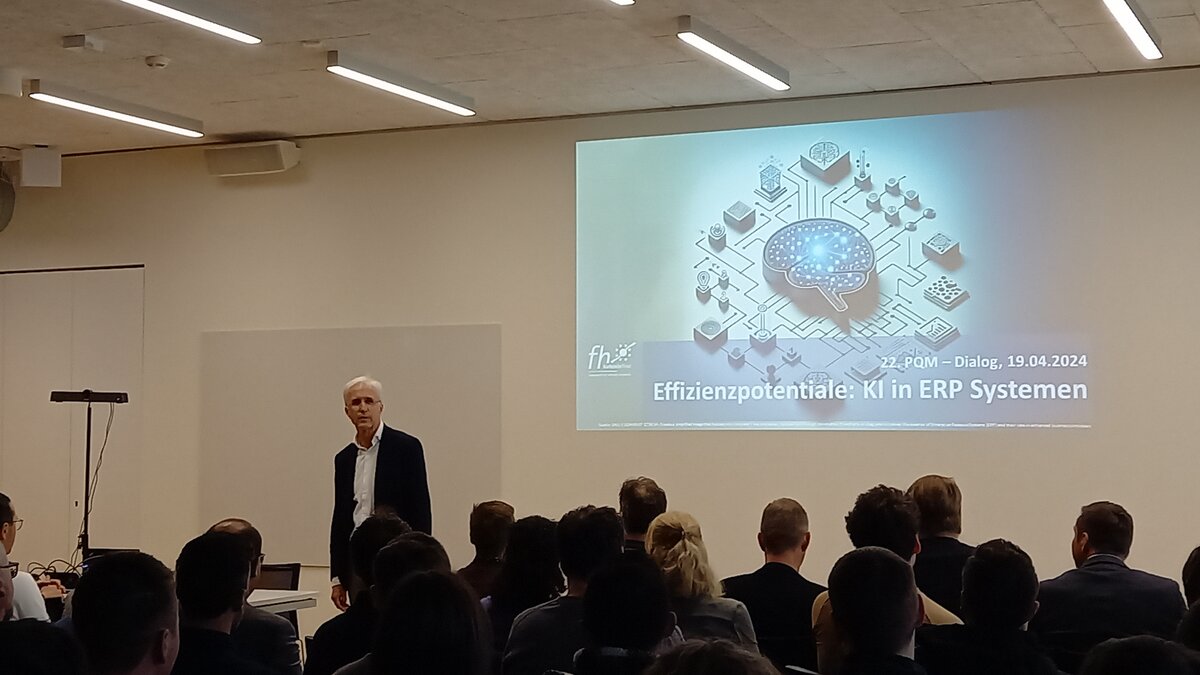Efficiency potential: AI-supported processes in ERP systems
- 26.04.2024
- General

At the 22nd PQM Dialogue at the Kufstein University, everything revolved around the use of artificial intelligence in ERP systems.
At the 22nd PQM Dialogue at the Kufstein University in mid-April, everything revolved around the use of artificial intelligence in ERP systems. Experts discussed opportunities, challenges and the future of AI in front of 140 participants and gave an optimistic outlook.
Students from the ERP Systems & Business Process Management master's programme at the Kufstein University organized the 22nd Process and Quality Management Dialogue on 19 April, which this year focused on AI-supported processes in Enterprise Resource Planning (ERP). In the opening presentation, Prof. Dr. Claudia Paganini, Professor of Media Ethics at Munich's higher education institution, pointed out the tension between euphoria and panic when introducing new technologies. The desire to overcome boundaries and at the same time the fear of being enslaved by the new technology has always shaped human behavior. Ms. Paganini gave an optimistic outlook on the application of artificial intelligence by pointing out that we should use historical analogies and arm ourselves against real dangers instead of fearing rumours.
DIVERSE INSIGHTS INTO THE APPLICATION AREAS OF KI
Prof (FH) Dr. Michael Kohlegger, Director of Studies for the Data Science & Intelligence Analytics Master's degree program at Kufstein University, described the different types of AI and the mechanisms behind them. The huge amount of training data, the human effort involved in training the algorithms, the large amount of energy required and the question of benefits in the form of added value were the focus of his presentation, which ended with the outlook that the use of AI will be quite normal in the future: AI does not matter.
Clemens Wasner, co-founder of the AI-Austria association, then gave an overview of the diverse activities of public and private institutions as well as the funding opportunities in Austria. Dr. Richard Mayr, founder and CEO Managing Director of the IT company Blue-Zone, then presented possible applications of AI in the ERP environment, such as the use of prompts in the cross-document linking of data, the creation of demo data in marketing or AI-supported programming.
PRACTICAL EXAMPLES AND CHALLENGES
In the following two parallel sessions, Fabio Eupen, Data Scientist at BE-Terna, presented how sales forecasts can be improved through the use of large language models. Karl Maresch and Markus Stranzinger from Assecco Solutions presented AI enhancements in the Applus ERP system. Using the example of a newly programmed ERP industry solution for media agencies, Fabian Kainz, COO of POOL Software & Consulting GmbH, showed how personal assistants and success forecasting functions can be part of the software using machine learning algorithms.
Johannes Keckeis, a long-standing ERP consultant at SIS-Consulting, pointed out the challenges of introducing artificial intelligence, such as insufficient training data or the lack of an overarching IT strategy.
The presentation on SAP Business AI by V. Vinay, Solution Manager at SAP in Waldorf, and Reinhard Taucher, Customer Solution Advisor at SAP Austria, rounded off the day. Both highlighted SAP's broad AI activities in the area of its business technology platform and in the ERP Cloud to create added value for customers through artificial intelligence.
